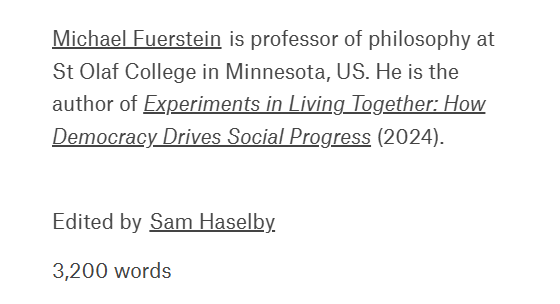Welcome to DU!
The truly grassroots left-of-center political community where regular people, not algorithms, drive the discussions and set the standards.
Join the community:
Create a free account
Support DU (and get rid of ads!):
Become a Star Member
Latest Breaking News
Editorials & Other Articles
General Discussion
The DU Lounge
All Forums
Issue Forums
Culture Forums
Alliance Forums
Region Forums
Support Forums
Help & Search
General Discussion
Related: Editorials & Other Articles, Issue Forums, Alliance Forums, Region ForumsHow same-sex marriage was propelled by democracy

Sometimes democracy works
Same-sex marriage is an astonishing case of progress propelled by democracy, in the face of public spite and misinformation
https://aeon.co/essays/same-sex-marriage-propelled-by-democracy-despite-public-ignorance

Couples celebrating their ‘holy union’ (marriage not recognised by the state) in 1996 at the Cathedral of Hope, Dallas, Texas, United States. Photo by A Abbas/Magnum Photos

The transformation of American public opinion on same-sex marriage is among the most remarkable and rapid shifts in moral consciousness ever recorded. Since the late 1980s, public approval of the practice climbed from 11 per cent to 70 per cent, where it has remained stable since 2021. What explains this?
This is in part a puzzle about democracy. On its face, democracy offers the promise of voice and foment, of revolution without war. And liberal democracies have indeed propelled just about every major social advance over the past 100 years or so: not only gay rights, but also labour rights, women’s rights, animal welfare, environmentalism and racial equality. The latter notably encompasses the dismantling of formalised racial segregation in the United States, another stunning (if highly imperfect) turn in moral history. Democracy isn’t the only factor that explains all this, but it is hard to tell a story about social progress in which it doesn’t play a key role. At the same time, recent events confirm what a large body of research has long established: democratic publics are largely ignorant and irrational, approaching politics in roughly the same spirit as bare-chested soccer fans contesting a foul. Most of us – and particularly those of us with broadly liberal intuitions – carry around these dissonant ideas together: democracy is an open invitation to the ignorant and, at the same time, a vital instrument of social progress.
Social history can help us make better sense of these intuitions. The case of same-sex marriage, in particular, provides an astonishing example of social progress at scale, propelled by democracy, among a public full of spite and misinformation. Here, democracy’s special virtue was its ability to convert minority grievances into ‘experiments in living’: interventions in social life that gradually reshape core social emotions and identities. That, in turn, enables people to respond to the grievances of groups otherwise marginalised under systemic oppression. Democracy thus drives social progress by improving the background conditions of moral cognition.
The American gay rights movement first began to take form in the 1950s, when hostility to homosexuality was the default, and a suffocating body of laws and norms forced homosexuals into a life of fear and repression. The earliest gay rights organisations in the US, such as the Mattachine Society and the Daughters of Bilitis, grew out of homosexuals’ increasing frustration with the status quo and, relatedly, a coalescing sense of homosexual identity itself. The earliest arguments for gay rights centred on the premise of basic equality, and drew on parallels with the movement for racial equality that was taking shape. Through the 1960s and ’70s, the movement grew into a larger and more vocal social force, achieving a progressive series of important cultural and legal changes: the formal revocation of the government’s ban on homosexual employees, the election of the first homosexual representative to the Massachusetts state legislature, and dozens of ordinances barring anti-gay discrimination at the county and municipal level.
snip